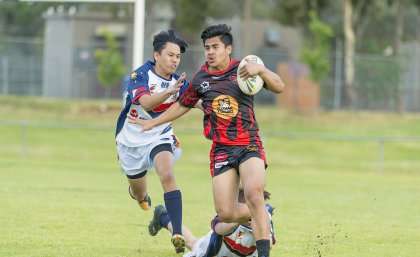Heightened levels of inconsistent sleep are unfavourable for athletes wanting to perform at their optimum. Credit: Sergio Montenegro
Junior rugby league players go to bed later than their senior counterparts and are therefore at risk of burning the candle at both ends if this isn't considered in their routine.
PhD student Johnpaul Caia from The University of Queensland's School of Human Movement and Nutrition Sciences has been comparing the sleep patterns of junior and senior Brisbane Broncos, with a view to high performance implications.
"We monitored sleep during a typical week of rugby league season and found junior athletes go to bed later, wake later and display greater differences in these times than their senior counterparts," Mr Caia said.
"Senior players typically went to bed just after 10pm and in comparison junior players went to bed closer to 11pm.
"Similarly, in the morning senior athletes woke just prior to 6.30am, while junior athletes woke closer to 7.30am."
The research will be used to provide recommendations to practitioners who work with adolescent and young adult athletes.
"Given the tendency of junior athletes to go to bed later at night, practitioners working with these groups should be conscious of the potential issues of scheduling early morning training sessions," Mr Caia said.
"If this strategy is unavoidable which could be the case with training required prior to school, then interventions to maximise sleep could be planned.
"These could include scheduling daytime naps and using strategies to assist sleep at night such as having a pre-bed routine and avoiding electronic device use in the lead up to bed."
The research is the first to examine variability as a means to better understand sleep within an athletic population
"Previous work has typically averaged sleep across several nights to provide an average estimate of sleep," Mr Caia said.
"While this is a good approach to allow basic insight into sleep it lacks the sophistication to provide an idea as to how sleep varies across multiple nights, a factor believed key to good sleep.
"We know from previous research that heightened levels of inconsistent sleep are unfavourable and may disrupt our biological rhythms."
Mr Caia is a performance scientist for UQ partners the Brisbane Broncos and part of the UQ School of Human Movement and Nutritional Sciences research team.
He works with athletes on several projects including analysing developmental pathways, the value of sports nutrition and methods of post-match recovery.
The study was published in the Chronobiology International Journal.
More information: Johnpaul Caia et al. Intra-individual variability in the sleep of senior and junior rugby league athletes during the competitive season, Chronobiology International (2017). DOI: 10.1080/07420528.2017.1358736
Provided by University of Queensland




















